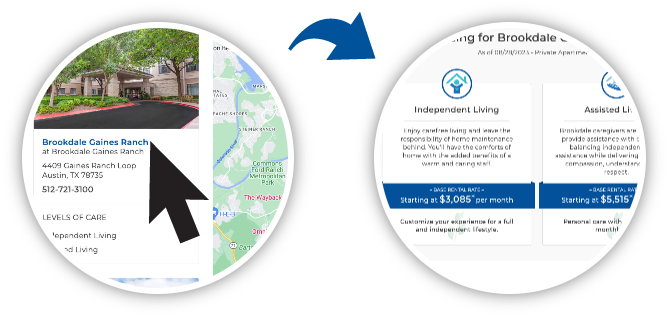- Home
- Brookdale Life
- Brookdale Blogs
- Weighing Costs: Your House Versus a Senior Living Community
- The Cost of Caregiving
Caregiver's Corner, Brookdale Solutions
January 9, 2017
The Cost of Caregiving
Unfortunately, her situation is all too common. Statistics tell the same story. On average, caregivers spend 24.4 hours a week providing care to their loved one with nearly one-quarter dedicating 41 or more hours of care a week, says this Caregiving in the US 2015 Report. Caregiving isn’t always a short-term job, either. The typical caregiver provides care for an average of five years and expects to continue for another five years.
Financial costs
Many caregivers are shocked at the stunning cost of caring for someone living with dementia. On average, caregivers lose more than $15,000 in annual income, points out the Alzheimer's Association, whose survey found many had to cut back on their own family’s food and medical care because of insufficient income. The Shriver Report: A Woman's Nation Takes on Alzheimer's found that the average cost of care for someone living with Alzheimer's is $56,800 per year. Of that cost, 60 percent — $34,500 per year — is covered by the family themselves. Although the bulk of that is in uncompensated care, families sometimes pay out of pocket for expenses as well.
As with many aspects of dementia, it is vital for those diagnosed with the disease to talk to their families about their wishes. Talk about formal care options, like long-term care or assisted living, discuss home health or ask about dividing caregiving responsibilities between family members. Once you understand your loved ones goals, you can make financial plans accordingly.
The Alzheimer’s Association is a great resource for understanding the costs of caregiving. The AARP has a site devoted to caregiving resources and pre-planning.
Impact on physical and emotional health
The demands of looking after a relative often affect the caregiver’s own health. According to the Alzheimer’s Association, nearly 60 percent of dementia caregivers say the emotional stress of caregiving is high or very high and about 40 percent suffer from depression.
Those who provide unpaid care (of any type) for 21 hours or more each week are particularly vulnerable to emotional stress and physical strain. On average, caregivers spend about $800 more per year on healthcare than non-caregivers, according to Brent Fulton, a coauthor of the Shriver Report. The 2010 Estimating the Impact of Caregiving and Employment on Well-Being report also notes that the number of positive activities caregivers engage in is reduced by 27.2 percent as a result of their responsibilities. The Family Caregiver Alliance has gathered additional sobering statistics on this issue.
I encouraged my friend to consider the impact this loving but very intense duty is having on her own life and whether it may be time to consider other options. I reassured her that doing so is not selfish – it can be for the best for everyone involved. I encourage all caregivers to do the same.
Categories
- Alzheimer's & Dementia
- Caregiver's Corner
- COVID-19
- Health, Safety and Wellness
- Financial Well-Being
- Passion & Purpose
- The Journey to Senior Living
- Trending Now
- Socialization & Relationships
- Brookdale Solutions
- Brookdale Vision and Growth
Archives
View All
- October 2025
- September 2025
- August 2025
- July 2025
- June 2025
- May 2025
- April 2025
- March 2025
- February 2025
- January 2025
- December 2024
- November 2024
X
Let us help find the right community for you!
Complete the form and a Senior Living Advisor will be in touch!
Inside Brookdale Communities
See what’s happening on our community Instagram pages
Brookdale has communities near you!



